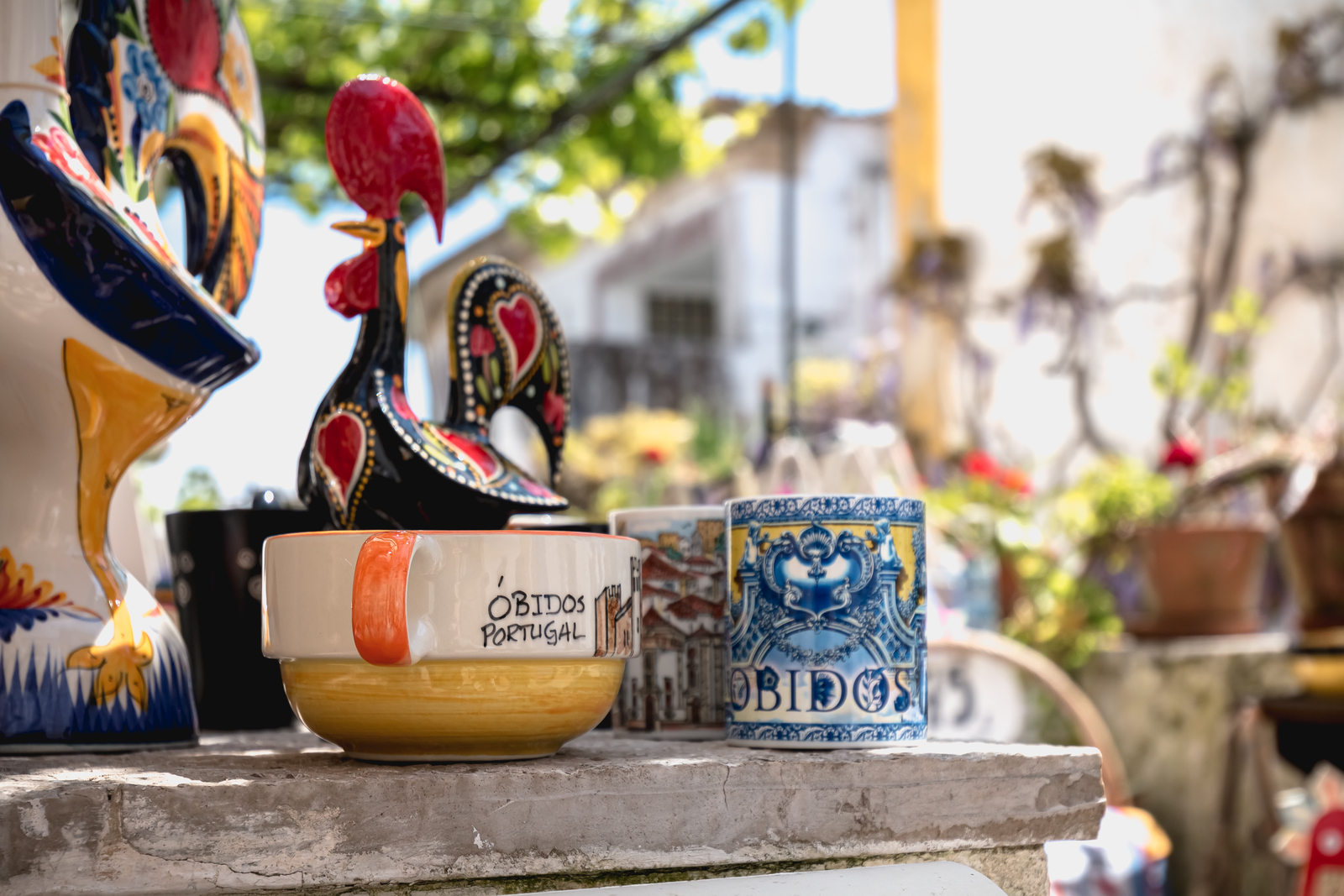Souvenirs from Portugal: Unique Treasures to Remember Your Trip
When you think of Portugal, images of stunning landscapes and rich history come to mind, but don’t forget about the treasures you can bring back home.
Portugal is known for its unique souvenirs, from exquisite ceramics and vibrant tiles to delicious food products like olive oil and traditional pastries. These items not only capture the essence of your travels but also serve as perfect gifts for friends and family.
As you explore the charming streets of Lisbon, Porto, and beyond, you’ll discover a variety of handcrafted goods that reflect the culture and artistry of Portugal.
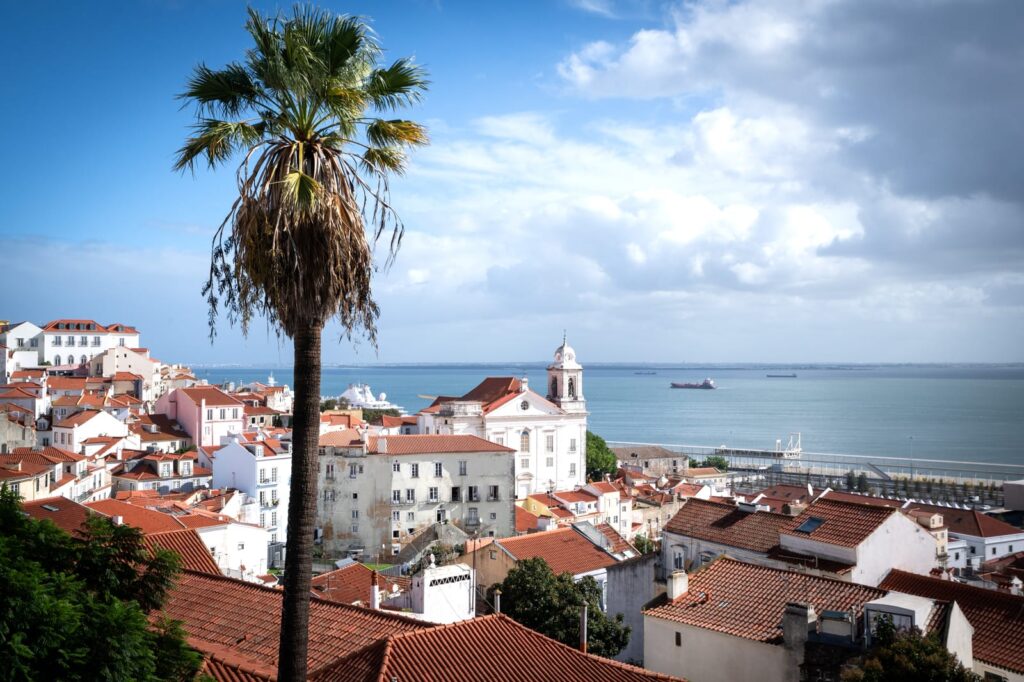
You’ll want to keep an eye out for the iconic Barcelos Rooster or beautiful cork products that showcase the country’s sustainability efforts. Each piece tells a story and brings a piece of Portugal with you.
Whether you are a foodie, an art lover, or simply searching for something special, there’s a souvenir that matches your interests. Join the journey to uncover the best items to bring home from your Portuguese adventure, making each purchase a memorable part of your experience.
History of Portuguese Souvenirs
Portuguese souvenirs have evolved over centuries, reflecting the country’s rich cultural heritage and historical journeys. The unique crafts developed through traditional methods are a testament to Portugal’s artisanal skills, while the era of exploration significantly influenced the types of items you might find today.
Traditional Crafts
In Portugal, traditional crafts have deep roots, often passed down through generations. Artisans proudly create unique pieces that showcase regional skills. Some notable crafts include:
- Azulejos: These vibrant ceramic tiles date back to the 15th century, featuring intricate patterns and designs. They are not only decorative but serve as historical narratives in both public and private spaces.
- Filigree Jewelry: This delicate technique, using thin threads of gold or silver, has been practiced since the 16th century. Each piece is a work of art, often used in necklaces and earrings.
- Lace Making: Known as “renda,” this craft is particularly prominent in Peniche. The lace produced is characterized by intricate floral and geometric patterns, often used in table linens and clothing.
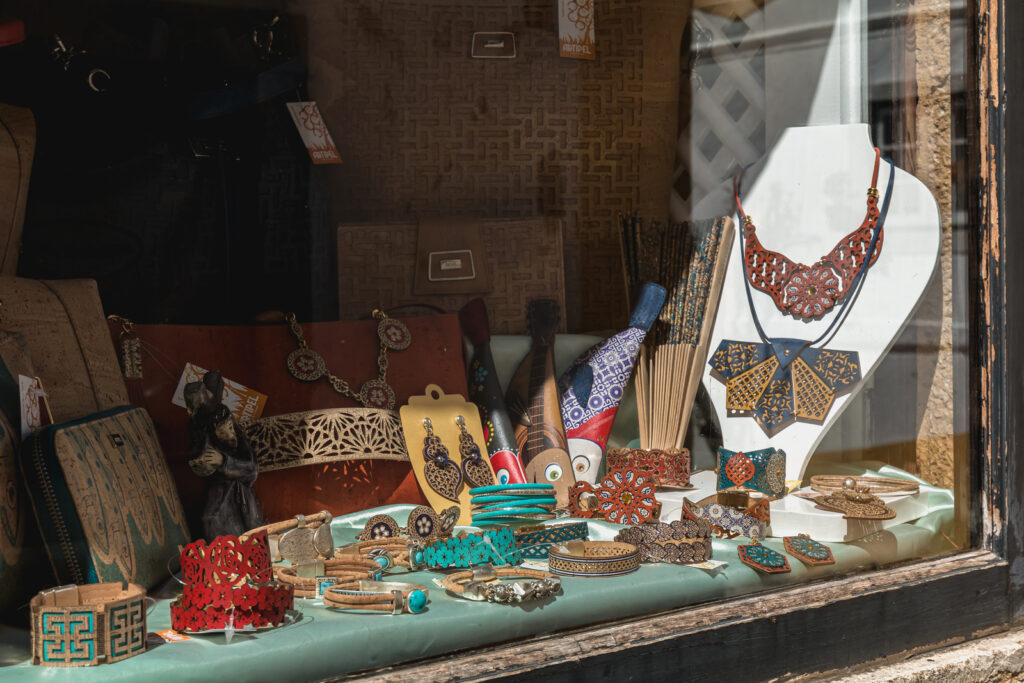
These traditional crafts highlight Portugal’s commitment to preserving its cultural heritage.
Influence of Portuguese Expansion
The Age of Discoveries, from the late 15th to early 17th centuries, marked a significant time for Portugal’s influence on global trade. As explorers traveled to Africa, Asia, and the Americas, they brought back unique items that transformed Portuguese souvenir offerings.
You’ll find pottery from the East, textiles inspired by African traditions, and spices that enriched Portuguese cuisine.
The exploration era not only introduced new materials but also influenced local artisans. This resulted in a fusion of styles, evident in modern souvenirs, where traditional techniques blend with influences from across the globe.
This rich history continues to shape what makes Portuguese souvenirs special to travelers.
Ceramics and Pottery
Portugal boasts a rich tradition of ceramics and pottery, which reflects the country’s cultural heritage. From beautifully crafted tiles to vibrant earthenware, these items make for memorable souvenirs.
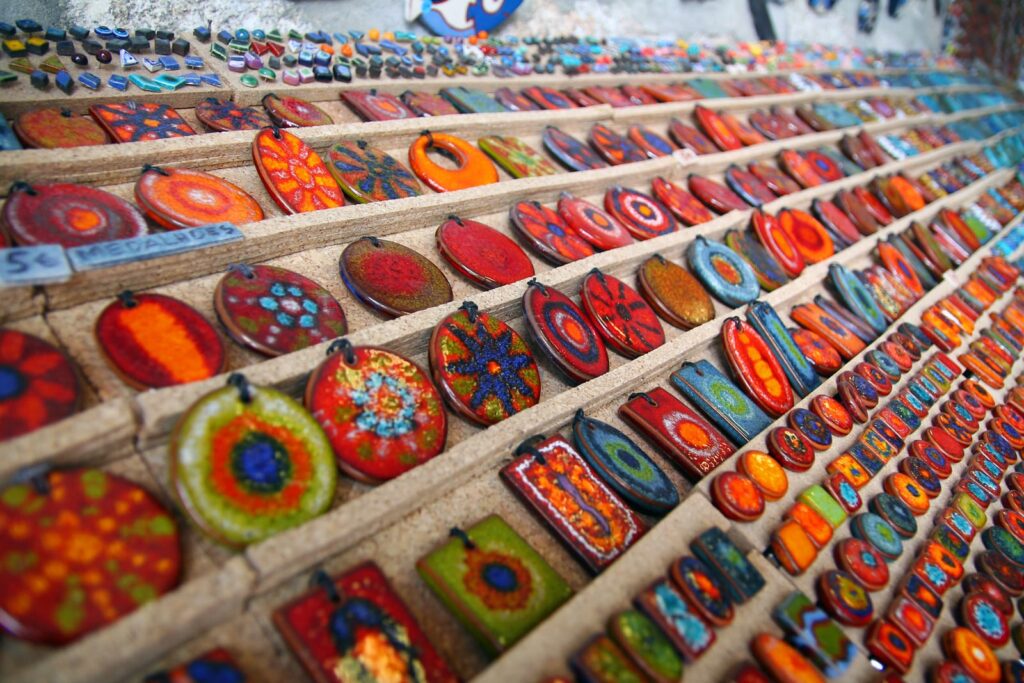
Azulejos Tiles
Azulejos are decorative ceramic tiles that are a hallmark of Portuguese architecture. These tiles often feature intricate patterns, vivid colors, and scenes from history or folklore.
You can find azulejos adorning churches, palaces, and even homes throughout Portugal. They serve both functional and aesthetic purposes, creating stunning façades.
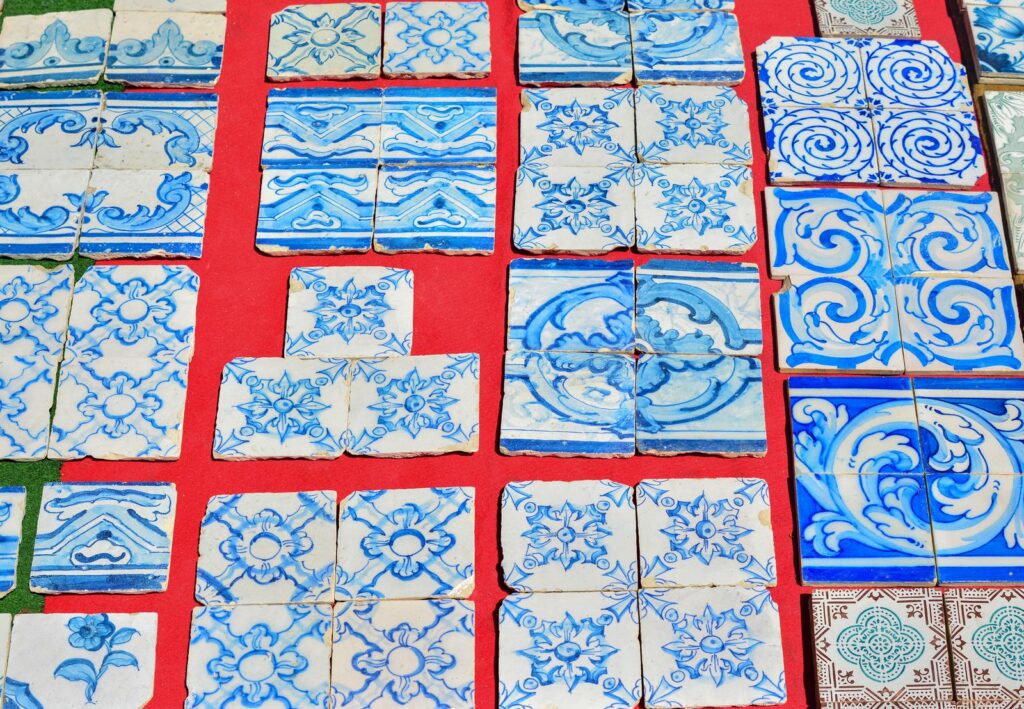
You might consider purchasing a few tiles as a unique way to bring a piece of Portugal home. Many shops sell both original and reproduction tiles, allowing you to choose what suits your style and budget.
Portuguese Earthenware
Portuguese earthenware is another treasured souvenir option. Known for its rustic charm, this pottery often showcases hand-painted designs and vibrant colors.
You’ll find a variety of items, from plates and bowls to pots and vases. One well-known brand is Vista Alegre, producing fine ceramics that are popular among locals and visitors alike.
When shopping, look for unique pieces that capture the essence of Portuguese craftsmanship. Consider visiting outlets or local markets, where you can find both traditional and contemporary designs to suit your taste.
Textiles and Embroidery
When visiting Portugal, you’ll discover a rich tradition of textiles and embroidery that reflects the country’s heritage. From high-quality linen and wool products to unique embroidery techniques, these souvenirs can offer you a touch of Portuguese culture to take home.
Linen and Wool Products
Portugal is known for its exquisite linen and wool textiles. Linen is particularly favored due to its breathability and durability, making it ideal for clothing and home decor.
You can find beautiful linen products such as tablecloths, napkins, and delicate bed linens, widely available in markets and specialty shops.
Wool is another staple, used to create warm and cozy garments. You can buy handmade woolen blankets and traditional Portuguese sweaters called “capas,” which are perfect for cooler weather. Many artisans still practice time-honored methods in small workshops, ensuring that each piece is crafted with care and quality.
Embroidery Techniques
The art of embroidery in Portugal is renowned, particularly in regions like Viana do Castelo. This area is famous for its colorful and intricate designs.
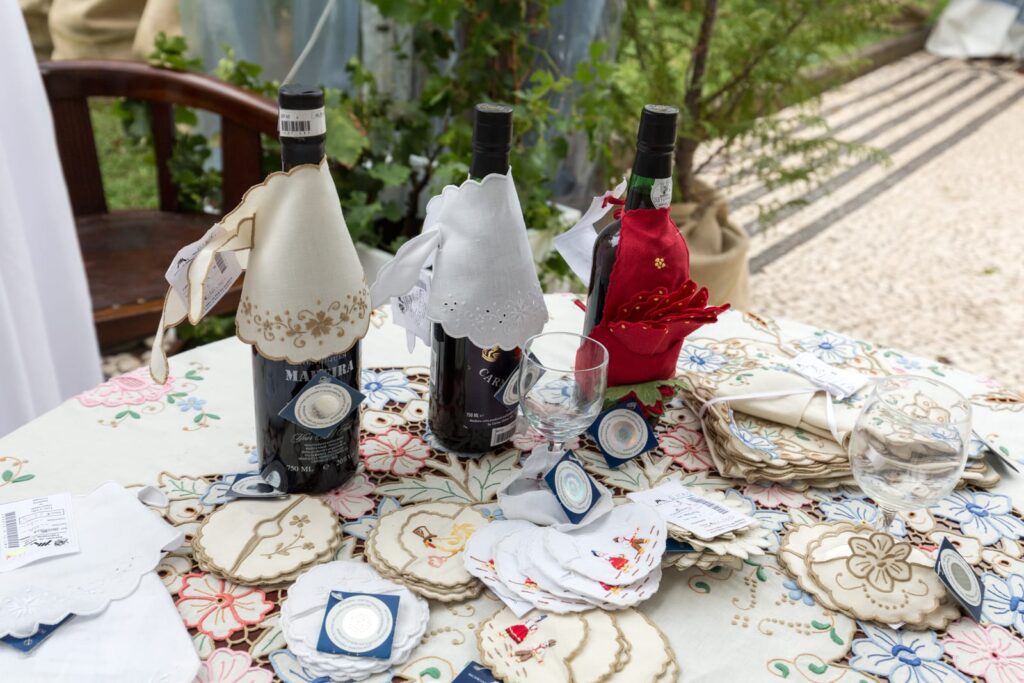
You may find embroidered pieces like table runners, pillowcases, and decorative fabrics that showcase stunning craftsmanship.
Various techniques are employed by skilled artisans, such as “ponto cruz” (cross-stitch) and “ponto de pé” (applique). Each technique tells a story and adds unique character to the finished product. Be sure to look for shops specializing in handmade embroidery, where you can discover unique items that you won’t find elsewhere.
Cork Products
Cork products from Portugal are not only unique but also eco-friendly. They make fantastic souvenirs that showcase Portugal’s rich natural resources and craftsmanship. You’ll find a variety of cork items that highlight the versatility of this remarkable material.
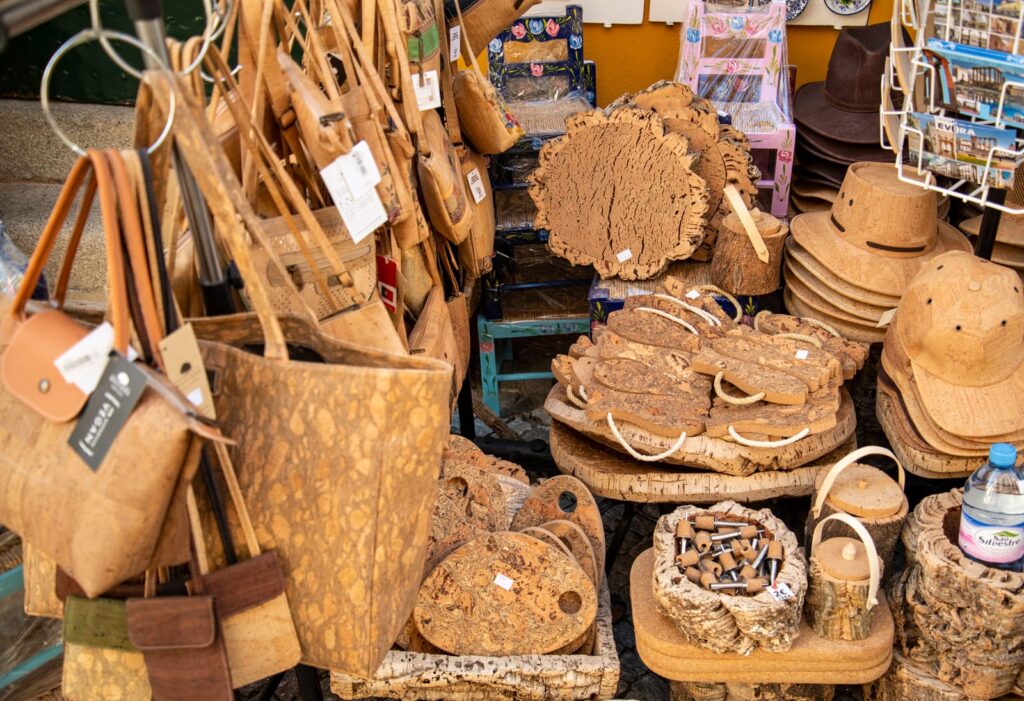
Cork Accessories
Cork accessories are popular among travelers seeking distinctive items. You can find everything from stylish purses to practical wallets made from cork. These products are lightweight, durable, and water-resistant, making them ideal for everyday use.
In addition to being functional, cork accessories come in various designs and colors. Local artisans often personalize them, adding a touch of Portugal’s culture. Whether you’re shopping for yourself or a friend, cork accessories are a thoughtful choice that captures the essence of Portuguese craftsmanship.
Cork Home Decor
Cork home decor pieces bring a touch of nature into your living space. Popular items include cork coasters, wall art, and decorative bowls. These pieces not only look great but also add warmth and character to your home.
Using cork in decor promotes sustainability. It is a renewable resource, and many products feature intricate designs that highlight artisanal skills. By choosing cork decor, you’re inviting a bit of Portugal’s charm into your life while supporting environmentally-friendly practices.
Wine and Gourmet Treats
Portugal is renowned for its high-quality wine and gourmet food products. When exploring the country, you’re bound to discover a variety of delightful options to bring home.
Port Wine
Port wine is perhaps the most famous product from Portugal, originating from the Douro Valley. This fortified wine offers a range of flavors, from rich and fruity to nutty or spicy, depending on its age and type.
When you purchase Port, consider choosing a vintage variety for a unique experience. Don’t forget to ask about the tasting notes from local sellers, as they can enhance your understanding of each bottle’s character.
Accompany your Port with traditional Portuguese cheeses for a delightful pairing. Treat yourself to a tasting session at one of the many wine cellars in Porto, where you can sample several varieties and learn about their production processes.
Olive Oil and Cheese
In addition to wine, Portugal is famous for its exceptional olive oils and cheeses.
Portuguese olive oils often boast a robust flavor, thanks to the country’s ideal climate and traditional pressing methods.
Look for regional options, such as Azeite do Alentejo, known for its fruity and nutty qualities. These oils make fantastic gifts and can elevate your culinary creations at home.
Portuguese cheeses, including Queijo da Serra and Azeitão, are also a must-try. Their unique flavors pair wonderfully with bread or fruits, making them perfect additions to any gourmet basket. Don’t hesitate to explore local markets for authentic, artisanal options.
If you join e.g. a food tour in Lisbon, you will learn even more about the best Portuguese delicacies and where to find them.
Jewelry and Filigree
When exploring souvenirs from Portugal, jewelry, especially filigree, stands out as a unique and beautiful choice. The craftsmanship involved in this traditional art form reflects the rich cultural heritage of the country.
Gold and Silver Works
Portuguese filigree jewelry is renowned for its delicate and intricate designs, typically made from gold or silver. The technique involves twisting fine threads of metal into stunning patterns, creating pieces that are both lightweight and eye-catching.
This style often includes religious symbols, such as hearts of Viana, making them meaningful gifts. You can find a variety of items, including earrings, necklaces, and bracelets. Many artisans incorporate semi-precious stones to enhance these pieces, adding a touch of color and uniqueness.
Filigree jewelry is not just a treasure to wear; it’s a piece of Portugal’s history, showcasing artisanal skills that have been passed down through generations.
Contemporary Designs
Today, many artisans blend traditional filigree techniques with contemporary styles. This fusion creates a fresh aesthetic that appeals to modern tastes while honoring the past.
You can discover innovative designs that feature minimalist shapes alongside complex filigree work. Jewelry designers often experiment with materials like resin and glass, creating striking contrasts with classic metal filigree.
Whether you prefer bold statement pieces or delicate everyday wear, you’ll find an array of options. This evolution in design allows you to take home a piece of Portugal that feels both timeless and current.
Cultural Items
When exploring the cultural treasures of Portugal, you’ll find unique items that reflect the country’s rich traditions and artistic expressions. Two noteworthy categories include Fado music memorabilia and literature that captures the essence of Portuguese life.
Fado Music Related Items
Fado music is a soulful genre that speaks to the heart of Portuguese culture. As a fan, you might appreciate items such as Fado CDs, which often feature famous artists like Amália Rodrigues and Carlos do Carmo.
Handcrafted musical instruments used in Fado, such as the Portuguese guitar, make for special keepsakes. You can also find charming posters and artwork showcasing Fado performances, perfect for bringing a touch of Portugal into your home. Don’t forget to explore local markets, where you might discover vinyl records or unique merchandise from concerts that illustrate the beauty of this music genre.
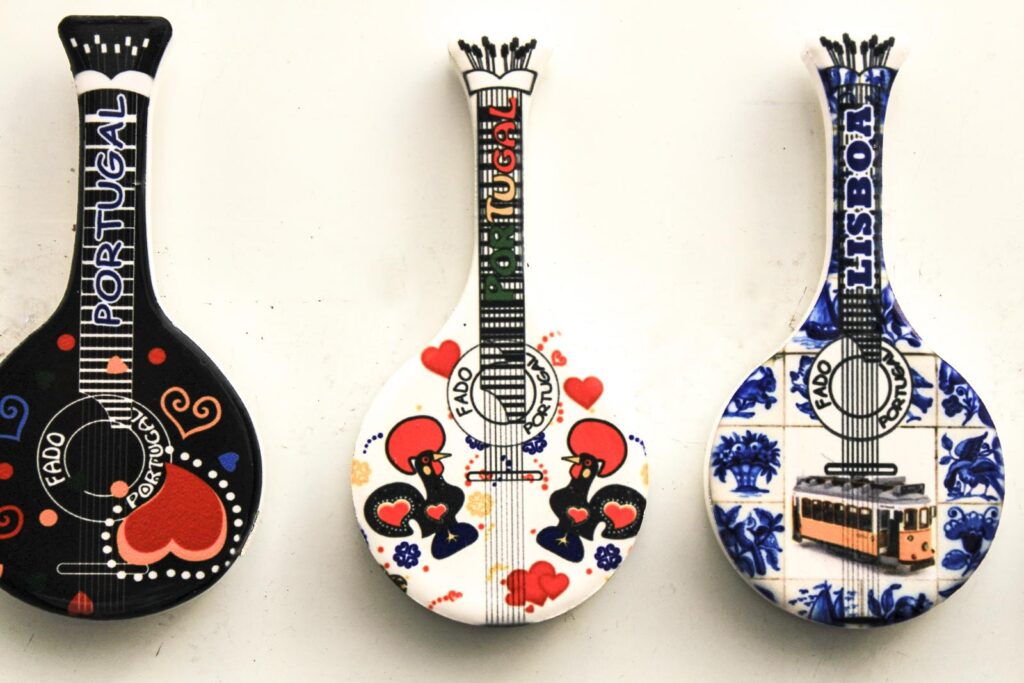
Books and Literature
Books and literature offer insights into the Portuguese way of life. One significant item to consider is the works of acclaimed authors like José Saramago, a Nobel Prize winner. His novels reflect deep themes and serve to connect you with Portugal’s narrative landscape.
Additionally, you can look for poetry collections by poets such as Fernando Pessoa, whose literary contributions are profound. For a lighter touch, travel guides and cookbooks that highlight Portuguese cuisine can help you recreate traditional dishes. These literary pieces not only serve as entertaining reads but also deepen your understanding of Portuguese culture and history.
Typical Portuguese Apparel
When you think of Portuguese apparel, you might envision vibrant traditional costumes alongside the influence of modern fashion. Each reflects the country’s rich cultural heritage and evolving styles.
Traditional Costumes
Traditional Portuguese costumes vary significantly by region. One of the most recognized is the Minho costume, often worn during festivals. Women typically wear colorful skirts, embroidered blouses, and intricate shawls. Men might don white shirts paired with dark trousers and capes.
Another notable outfit is the Madeiran costume, known for its bright colors and unique patterns. The infatuation with handmade textiles adds to its charm. These costumes showcase Portugal’s commitment to preserving its cultural identity.
Occasionally, you might also come across the Alentejo costumes, which feature more muted tones and rustic designs. Each piece tells a story of local customs and history.
Modern Fashion Influences
Portugal’s fashion scene has evolved, blending traditional elements with contemporary styles. Cities like Lisbon and Porto are now hubs for chic boutiques and designer labels. Notable designers draw inspiration from the country’s rich fabrics and craftsmanship.
You’ll find modern apparel that incorporates traditional textile techniques. For instance, cork material, a sustainable resource, has made its way into clothing and accessories.
Street style in urban areas is also vibrant, blending global trends with Portuguese flair. Look for bright colors and bold patterns that showcase local artistry. Popular brands often highlight their heritage, making both fashion and culture accessible.
This blending of old and new in Portuguese apparel creates a unique and exciting fashion landscape.
Regional Specialties
Portugal offers a variety of regional specialties that reflect its diverse culture and culinary traditions. Each area has its own unique creations that can make delightful souvenirs for you to take back home.
Northern Portugal
In Northern Portugal, you’ll find rich flavors and artisanal crafts. One standout is Queijo da Serra, a semi-soft cheese made from sheep’s milk. It has a distinctive sharpness that pairs beautifully with wine and bread.
Another specialty is the Filigree jewelry, an intricate and delicate craft that showcases Portugal’s historical artistry. Made from fine threads of gold or silver, this jewelry can be both a unique fashion statement and a piece of cultural heritage.
Don’t miss out on canned sardines, especially beautifully packaged varieties from brands like Ramirez. These are not just tasty but also make for a charming and authentic gift.
Algarve Region
Traveling to the Algarve region, you’ll discover an abundance of culinary treasures.

Algarvian orange marmalade is a popular choice, crafted from the region’s sweet, juicy oranges. This preserves the vibrant taste that can brighten up your breakfast.
Chouriço, a flavorful Portuguese sausage, is another highlight.
Grilled or enjoyed with local bread, it’s a true taste of the region that you can find in many local markets.
Lastly, consider ceramics from the Algarve.
These colorful pieces, often hand-painted with traditional patterns, are perfect for home decor and will remind you of sunny days spent by the coast.
Buying Souvenirs in Portugal
When you’re in Portugal, finding the perfect souvenir is a delightful part of the experience. Local shops and markets offer unique items that capture the essence of Portuguese culture.
Understanding where to shop and how to bargain can enhance your buying experience.
Best Shops and Markets
To discover authentic souvenirs, head to local markets like Mercado da Ribeira in Lisbon or Mercado do Bolhão in Porto.
These vibrant spots showcase a variety of local products, from traditional ceramics to gourmet treats.
You might also explore specialty shops that focus on artisanal goods, such as filigree jewelry or handmade azulejos (decorative tiles).
Areas like Alfama in Lisbon are filled with small boutiques where you can find unique items.
Don’t forget to check out souvenir shops near popular tourist attractions. They often carry regional specialties, making your shopping both convenient and enjoyable.
Tips for Bargaining
Bargaining is often part of the shopping experience in Portugal, especially in markets.
Approach negotiations with a friendly attitude. Start by asking about the price, then express curiosity about the item.
If it’s a market setting, offering a lower price can prompt a good-natured counteroffer. Remember that many vendors appreciate a little back-and-forth.
Avoid aggressive tactics; being polite generally yields better results.
If you feel the price is too high, don’t hesitate to walk away. This can sometimes result in the seller offering you a better deal.
Enjoy the process, and let your personality shine as you shop!
Authenticity and Sustainability
When you shop for souvenirs in Portugal, you’re not just bringing home gifts; you’re embracing the country’s rich traditions.
Authentic items reflect local craftsmanship, making them unique to Portugal.
One popular choice is cork products. Portugal is the largest producer of cork worldwide, and these items are both stylish and sustainable.
You’ll find bags, coasters, and even clothing made from this renewable resource.
Another great option is filigree jewelry. This intricate craftsmanship dates back to the 16th century and represents a deep connection to Portuguese culture.
Each piece you buy supports local artisans and helps preserve this age-old technique.
Consider sampling and purchasing canned sardines. Not only are they delicious, but the packaging is often artistically designed.
Brands like Ramirez and Tricana create products that are both tasty and visually appealing.
By choosing souvenirs made from locally sourced materials, you contribute to sustainable practices. This choice helps support the economy while ensuring you take home a piece of Portugal’s heritage.

